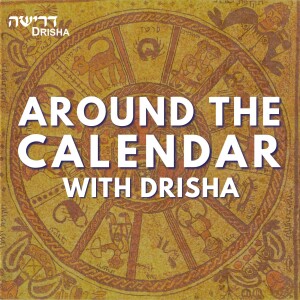Around the Calendar with Drisha
Over the years, Drisha has offered Torah classes on the many observances that mark out the timeline of the Jewish yearly cycle. Around the Calendar brings you all our holiday- and observance-focused classes, from our back catalog of recordings and continuing through our contemporary shiurim and lectures.
Episodes

Friday Dec 15, 2023
Friday Dec 15, 2023
In this course, we will explore the Yom Kippur service of the Kohen Gadol, a significant but sometimes enigmatic aspect of the liturgy. By delving into the significance and symbolism behind key elements of the service, we will confront many of the fundamental questions of Yom Kippur, such as whether atonement can happen without repentance, the influence of fate and destiny, and the profound impact an individual’s actions can have on the community.

Friday Dec 15, 2023
Friday Dec 15, 2023
Session 1: Wake Up
Throughout the month of Elul, Jewish communities rise early for Selihot, whose words and melodies serve to awaken us to teshuva (repentance) and Seliha (forgiveness). We will study the text and themes of several Selihot piyyutim together, including the opening piyyut "Ben Adam Mah Lekha Nirdam" ("Human Being, Why do you Slumber?")

Friday Dec 15, 2023
Friday Dec 15, 2023
Our Rosh Hashana liturgy is full of stories of mothers who sacrifice. Hagar and Hannah sacrifice their sons. Sarah and Em Sisra's sons are sacrificed by others. Rachel is sacrificed for her child. This course will explore these stories of maternal sacrifice and raise questions about the role of maternal sacrifice in creation. Specifically, is it necessary? Even if it is necessary, is it good?

Friday Dec 15, 2023
Friday Dec 15, 2023
Our Rosh Hashana liturgy is full of stories of mothers who sacrifice. Hagar and Hannah sacrifice their sons. Sarah and Em Sisra's sons are sacrificed by others. Rachel is sacrificed for her child. This course will explore these stories of maternal sacrifice and raise questions about the role of maternal sacrifice in creation. Specifically, is it necessary? Even if it is necessary, is it good?

Friday Dec 15, 2023
Friday Dec 15, 2023
Often in Elul, Sukkot is forgotten. We focus on the High Holidays but forget that Sukkot comes immediately after. There are several unique rules that characterize the laws of Sukkot, such as mere discomfort exempting one from living in the Sukkah and the heightened requirements for beauty in the Arba Minim. We will explore whether these laws are unique to Sukkot or act as paradigms of broader Torah values.

Friday Dec 15, 2023
Friday Dec 15, 2023
The Yamim Noraim prayers have their own distinctive nusach, as well as many melodies which are sung in various communities. In this three part series, we will listen to and reflect upon selected niggunim and songs, exploring how the music reflects an understanding of the liturgy.

Friday Dec 15, 2023
Friday Dec 15, 2023
How can we know what God wants of us? In Genesis 16, Sarai, Avram, and Hagar all struggle to understand their roles in God's covenant. Their interactions and their mistakes lay the groundwork for Genesis 21, the powerful Torah reading of the first day of Rosh haShannah. We will do a close reading of both of these biblical texts and utilize rabbinic midrashim to explore each character's motivation and why this story was chosen to be read on the Day of Judgment.

Friday Dec 15, 2023
Friday Dec 15, 2023
In this series, we will conduct a close reading of the text of Lamentations. We will focus on the poetry, the significance of Jerusalem's destruction and the ways it is shown, the use of gender in the book, and the ideas of mourning, exile, and return.

Friday Dec 15, 2023
Friday Dec 15, 2023
In this series, we will conduct a close reading of the text of Lamentations. We will focus on the poetry, the significance of Jerusalem's destruction and the ways it is shown, the use of gender in the book, and the ideas of mourning, exile, and return

Friday Dec 15, 2023
Friday Dec 15, 2023
Dating back to the time of the Geonim, scholars and poets composed Azharot, poetic enumerations of the mitzvot. They were traditionally read in communities on Shavuot, a custom that continues today in some Sephardic communities. We will explore this fascinating liturgical phenomenon and their mixed reception throughout the ages. Focusing on the Azharot of Solomon ibn Gabirol, we will survey this masterful poem's structure and methodology and learn a traditional melody for these Azharot.







